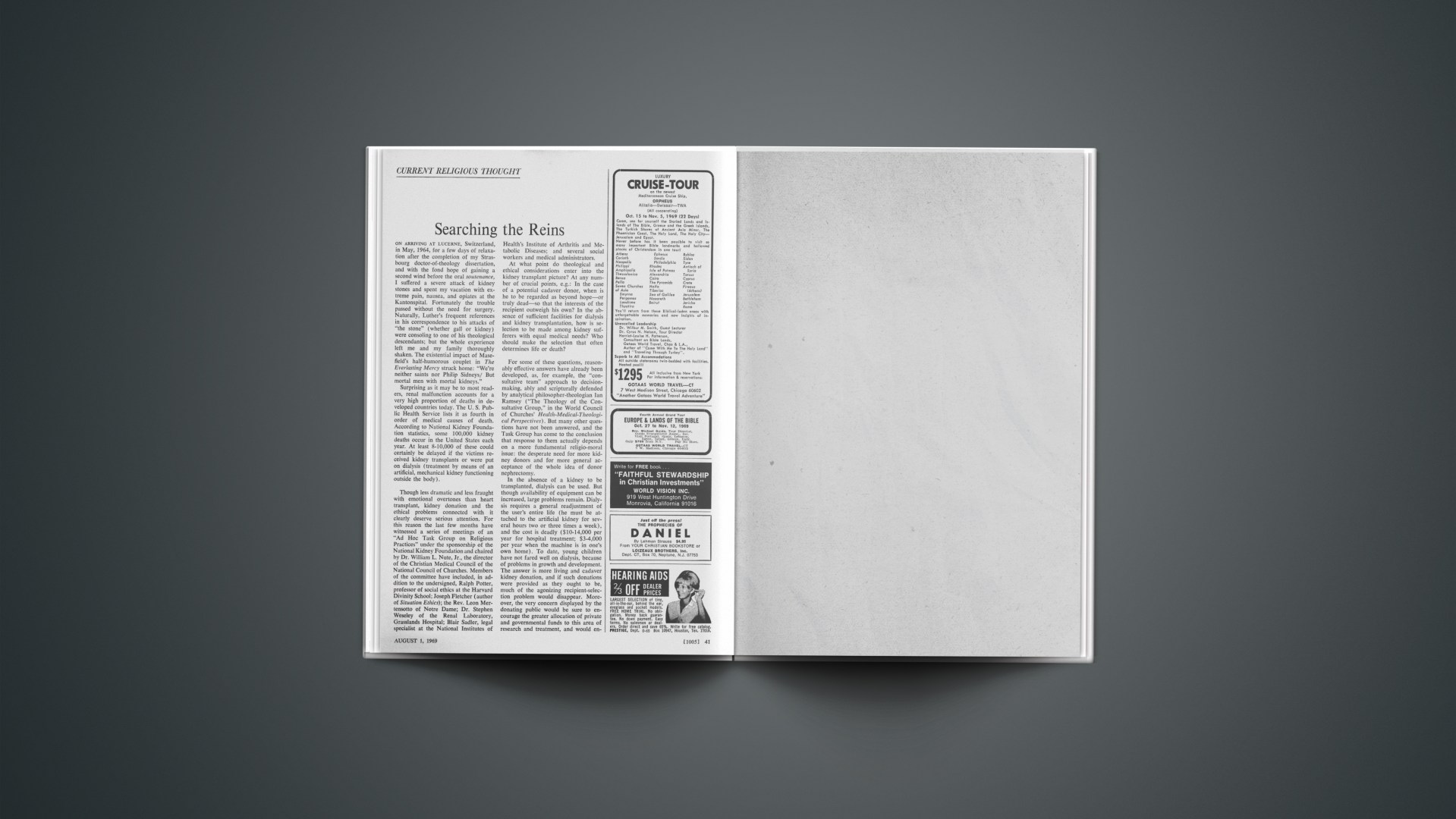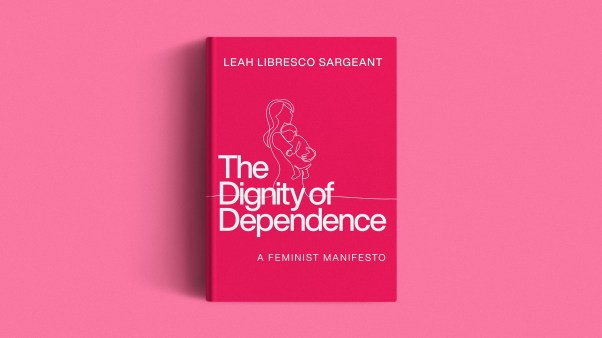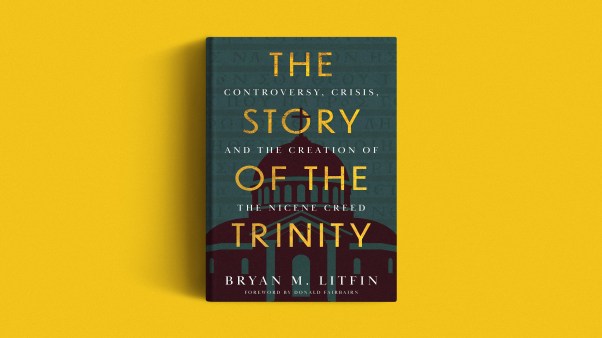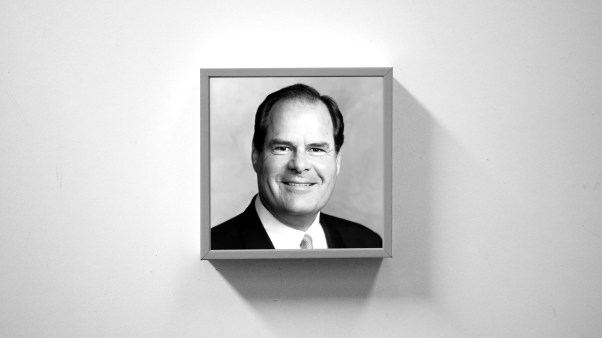On arriving at lucerne, Switzerland, in May, 1964, for a few days of relaxation after the completion of my Strasbourg doctor-of-theology dissertation, and with the fond hope of gaining a second wind before the oral soutenance, I suffered a severe attack of kidney stones and spent my vacation with extreme pain, nausea, and opiates at the Kantonspital. Fortunately the trouble passed without the need for surgery. Naturally, Luther’s frequent references in his correspondence to his attacks of “the stone” (whether gall or kidney) were consoling to one of his theological descendants; but the whole experience left me and my family thoroughly shaken. The existential impact of Masefield’s half-humorous couplet in The Everlasting Mercy struck home: “We’re neither saints nor Philip Sidneys/ But mortal men with mortal kidneys.”
Surprising as it may be to most readers, renal malfunction accounts for a very high proportion of deaths in developed countries today. The U. S. Public Health Service lists it as fourth in order of medical causes of death. According to National Kidney Foundation statistics, some 100,000 kidney deaths occur in the United States each year. At least 8–10,000 of these could certainly be delayed if the victims received kidney transplants or were put on dialysis (treatment by means of an artificial, mechanical kidney functioning outside the body).
Though less dramatic and less fraught with emotional overtones than heart transplant, kidney donation and the ethical problems connected with it clearly deserve serious attention. For this reason the last few months have witnessed a series of meetings of an “Ad Hoc Task Group on Religious Practices” under the sponsorship of the National Kidney Foundation and chaired by Dr. William L. Nute, Jr., the director of the Christian Medical Council of the National Council of Churches. Members of the committee have included, in addition to the undersigned, Ralph Potter, professor of social ethics at the Harvard Divinity School; Joseph Fletcher (author of Situation Ethics); the Rev. Leon Mertensotto of Notre Dame; Dr. Stephen Weseley of the Renal Laboratory, Grasslands Hospital; Blair Sadler, legal specialist at the National Institutes of Health’s Institute of Arthritis and Metabolic Diseases; and several social workers and medical administrators.
At what point do theological and ethical considerations enter into the kidney transplant picture? At any number of crucial points, e.g.: In the case of a potential cadaver donor, when is he to be regarded as beyond hope—or truly dead—so that the interests of the recipient outweigh his own? In the absence of sufficient facilities for dialysis and kidney transplantation, how is selection to be made among kidney sufferers with equal medical needs? Who should make the selection that often determines life or death?
For some of these questions, reasonably effective answers have already been developed, as, for example, the “consultative team” approach to decision-making, ably and scripturally defended by analytical philosopher-theologian Ian Ramsey (“The Theology of the Consultative Group,” in the World Council of Churches’ Health-Medical-Theological Perspectives). But many other questions have not been answered, and the Task Group has come to the conclusion that response to them actually depends on a more fundamental religio-moral issue: the desperate need for more kidney donors and for more general acceptance of the whole idea of donor nephrectomy.
In the absence of a kidney to be transplanted, dialysis can be used. But though availability of equipment can be increased, large problems remain. Dialysis requires a general readjustment of the user’s entire life (he must be attached to the artificial kidney for several hours two or three times a week), and the cost is deadly ($10–14,000 per year for hospital treatment; $3–4,000 per year when the machine is in one’s own home). To date, young children have not fared well on dialysis, because of problems in growth and development. The answer is more living and cadaver kidney donation, and if such donations were provided as they ought to be, much of the agonizing recipient-selection problem would disappear. Moreover, the very concern displayed by the donating public would be sure to encourage the greater allocation of private and governmental funds to this area of research and treatment, and would encourage more physicians to specialize in renal disorders.
Why are so few donor nephrectomies performed? In part the reason has been legal, since the Anglo-American common-law heritage has left a thicket of confusion in the area. But now, largely through the brilliant work of the brothers Sadler, a “Uniform Anatomical Gift Act” is in existence which, adopted as it almost certainly will be throughout the United States, will facilitate cadaver donation of organs (see JAMA, Dec. 9, 1968; Georgetown Law School, October, 1968).
Now the issue is one of motivation—motivation to donate kidneys both after death and during life. And motivation, here as elsewhere, depends squarely on one’s theology. Evangelical Christians have the strongest possible reasons for performing a service not only with their bodies after death but also through living donation of one of their paired kidneys. At the very center of the biblical message is the doctrine of substitution: Christ gave himself totally and unreservedly in our place and for our sins. The moral consequence is inescapable, whether expressed by a St. John (“we love because he first loved us”), a Luther (“give yourself as a Christ to your neighbor”), or a Charles Williams (“your life and death are with your neighbor”).
Of course, we theoretically reduce our chances of future survival by giving one of our kidneys (while the recipient who is our blood relative has a statistical 61–90 per cent chance of transplant success); but what about the 100 per cent de facto survival granted me by Christ through his act of substitution? And consider that one of the most basic analogies of salvation itself is the Pauline theme of the “grafting in of the Gentiles” (Rom. 11:17–24); as those grafted into Christ through no merit of our own, we have little to say against, and everything to say for, human grafting in behalf of others.
Where cadaver transplants are concerned, the foregoing arguments apply with even greater force, and the resurrection of the body offers no deterrent (Scripture speaks of the seedlike resurrection of a body which even in life is continually being replaced, not of particular organs in the body at the time of physical death—First Corinthians 15:35 ff.; Second Corinthians 4:16).
Evangelical Christians should thus contemplate with utmost seriousness the wider implications of Preisker’s judgment (Kittel, TWNT, art. “Nephros”): “The total claim which God makes on the community finds expression in the … saying that He tries the reins and the heart.”










